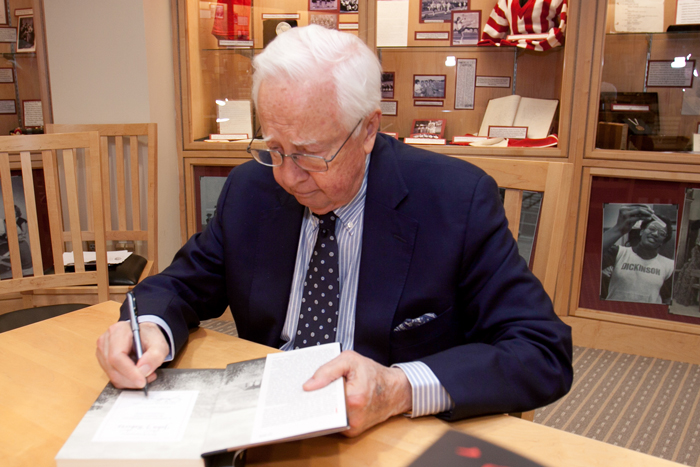Contemporary Revolutionary

David McCullough signs copies of his book during a 2011 visit to campus.
A Q&A with Pulitzer Prize-winning historian David McCullough
by Katya Hrichak ’17
Nearly 20 years after delivering the Commencement address at Dickinson in 1998, published recently in his book, The American Spirit, David McCullough believes the words he spoke then are still relevant today. Below, the Pulitzer Prize-winning historian talks about his interest in Dickinson, the importance of education and what Benjamin Rush would think of America in its current state.
How are the beliefs upon which Benjamin Rush founded Dickinson College still important today?
As soon as I began reading about Dickinson's history, its story, and particularly the involvement of Benjamin Rush, I was absolutely amazed by what a beginning it had and what an exceptional American Dr. Rush was. And I think that virtually almost everything that he stood for and devoted his energies and genius to is to the benefit of all us as part of our education. The idea that he wanted to bring modern romance languages, French in particular, to the academic curriculum at that time was amazing. Also, the idea that he felt that the insane ought to be treated in a humane way and not simply locked up in a cage for the rest of their lives, the idea that he was so courageous in serving as best he could as a physician in the midst of terrible smallpox or yellow fever epidemics, and, of course, the part he played in the creation of the Declaration of Independence. All of which are amazing in the extreme, even in that era, the 18th-century era, of the polymath—someone who's interested in everything and wants to learn as much as possible about everything, and he certainly exemplified that. I think also he reminds us, as no other signer of the Declaration of Independence does, how young they all were. He was only 30 years old.
How do you think the speech you delivered at the 1998 Commencement is still relevant today?
It’s even more relevant, I think, because so many of these issues, particularly the importance of education, the importance of honesty, the importance of tolerance, the importance of kindness and generosity to those who are less fortunate in their health or in their position in society, are American values that we must never lose sight of, must never let dwindle away or be treated as peripheral.
Are there any messages in the speech that you would change today?
I think I would put more emphasis on the importance of education, the importance of learning and the idea that it should never end in life. It's not just that you're going to college in order to get a degree and in order to get a job. That’s just the start. The most important, influential books that I have read in my life are all books that I've read since college. Not that I didn't have the advantage of a wonderful college education. I did, but it was just the beginning.
What do you think that Benjamin Rush would think of America and Dickinson today?
I think Benjamin Rush would be utterly amazed by today. I think he would feel that his prediction, that the American Revolution, philosophically, politically, is still underway. He would see it, understand it, but I think even more than that, he would be absolutely thrilled, amazed and startled in the extreme by the advances we've made in medicine. As a doctor, he would be swept off his feet because things have happened that no one even remotely imagined happening. ... I think that when future historians are writing about our time, this era, they will be far more interested in what has happened in medicine than they will be in what's happening in politics or trade unions or whatever.
It is exciting what's happened to universities and colleges. Imagine starting that tiny little college in what was then the wilderness and coming back and seeing what it is today. ... I think that we need to remind ourselves more about what cause we have to be optimistic and that the news isn't all bad. Yes, there's plenty of it that is quite bad, quite worrisome; we have very serious problems, but we've always had serious problems. That's been the human experience, the human story since the beginning. But we also have so many advantages that no generation before us ever had, and we ought to be more grateful and proud of that than we are.
Learn more
Published June 7, 2017